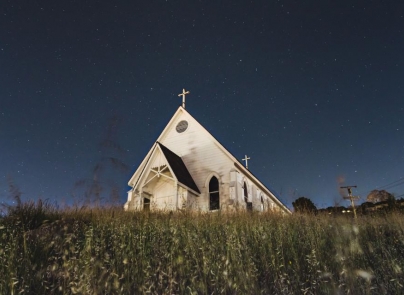Sanctification: A Perilous Journey for Roman Catholics

In an approved essay on the doctrine of “sanctifying grace,” an author at Catholic Answers brings us to the frightening precipice which his church’s doctrine demands.
Under the grim heading, “Spiritual Suicide,” the author says of sanctifying grace: “But you can lose it again by sinning mortally. Keep that word in mind: mortal. It means death. Mortal sins are deadly sins because they kill off this supernatural life, this sanctifying grace.”
Sanctification for the Roman Catholic is more danger than joy. You can kill off Christ’s holiness in you, a danger vastly exceeding the hardships of cross-bearing. This danger means hell remains a possibility for the justified.
The Catechism of the Catholic Church declares that “[mortal sin] results in the loss of charity and the privation of sanctifying grace, that is, of the state of grace. If it is not redeemed by repentance and God's forgiveness, it causes exclusion from Christ's kingdom and the eternal death of hell, for our freedom has the power to make choices for ever, with no turning back.” (CCC, 1861).
The lesson all Roman Catholics must learn about their church’s teaching on sanctification is that you have the power to throw it all away. You can do what Christ does not want done. Your supernatural life in God can be catastrophically ended by your own mortal sin. If afterward you die, before restoration by the sacrament of penance, you are in hell forever.
This error makes sin and the sinner mightier than the Savior. It opens a door God has closed: “There is therefore now no condemnation for those who are in Christ Jesus” (Romans 8:1). In Catholic theology the sinner must raise his own hand whenever the apostle asks: “Who shall separate us from the love of Christ?” (Romans 8:35).
Now in the parlance of Reformed protestants, it may sound like I have been speaking of a tenuous justification not a tenuous sanctification. But in Catholic theology I have been speaking of both. In their system of doctrine, the holiness of sanctification is the basis for the soul’s justification. Why? Because an actual personal infused holiness is required for justification.
In the Catholic system a person is justified before God because they are righteous, they themselves possess the requisite holiness. This divine holiness is first given at baptism, where one enters a state of sanctifying grace. But this justification must be maintained by one’s sanctification. This is accomplished through ongoing faith, charity, and most importantly, participation in the sacraments of the Catholic church.
Functionally, the sacraments have become the bureaucratic center of sanctification in Roman Catholic life. Provided you are not in a state of mortal sin, the mere administration of a sacrament does its appointed good (ex opere operato). But if you die laden with many faults, you can still “achieve the holiness necessary to enter the joy of heaven” through the painful punishments of purgatory (CCC, 1030). Purgatory is the last frontier of sanctification, a place for those justified to be fully purified.
In bright contrast to these foreboding skies, is biblical truth boldly re-asserted in the Reformation.
First, biblical justification is a period not a comma. I used this illustration with my ten-year old son last week as we discussed questions 33 and 35 in the Westminster Shorter Catechism. As a period brings a sentence to an end, so justification brings God’s wrath against the sinner to an end. Case closed. Christ by his obedience and death fully discharged my debt and made full satisfaction to his Father’s justice for my sin. Period.
The scriptures teach justification to be a declarative justification, on Christ merits, his righteousness imputed to me by faith alone (Rom. 4:5-8), not an infused justification maintained by me as I collaborate with God’s grace. No. “Since, therefore, we have now been justified by his blood, much more shall we be saved by him from the wrath of God” (Romans 5:8).
As for biblical sanctification, it is distinct from justification, but not separable. The justified will be sanctified – let all hypocrites take note. But those being sanctified must not think their pursuit of personal holiness maintains or completes their justification. What can be added to what Christ accomplished? Nothing.
Having been united to Christ, in the power of the Holy Spirit, the accomplishments of Christ belong to us freely and fully by faith. His righteousness belongs to us in justification. His holiness belongs to us in sanctification. We now strive for his holiness not dreading some precipice where we might kill off the life of God in us. We strive for holiness in love of God because his love for us in the gospel of his Son burns in our hearts, even unto an infallible assurance that we will never be ashamed. This joyful striving is a work of his free grace as the Spirit of Christ works in us to will and to do his good pleasure (Philippians 2:3).
The Catholic system of holiness has functionally become a vast bureaucracy. It hangs the dread of mortal sin over the justified, asserts the vain hope of sacramental actions, and threatens the strange invention of purgatorial purification. Christ’s mediation and might is greatly diminished. It is time for all who have ears to hear to come home. Come home to Christ, “who became to us wisdom from God, righteousness and sanctification and redemption” (1 Cor. 1:30).
John Hartley has been pastor of Apple Valley Presbyterian Church since 2010, having previously been a pastor for 10 years in Vermont. He is a Wisconsin native and a graduate of University of Wisconsin-Milwaukee as well as Dallas Theological Seminary. John lives with his wife Jen and their five children.





